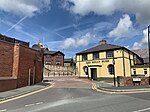Rhosymedre
Clwyd geography stubsPages including recorded pronunciationsVillages in Wrexham County Borough

Rhosymedre () is a village within the community of Cefn, in Wrexham County Borough, Wales. The Anglican church, which was consecrated in 1837, is dedicated to St John the Evangelist, and is part of the Diocese of St Asaph. Former vicars include John David Edwards (vicar from 1843 to 1885), whose most famous hymn tune composition is Rhosymedre, upon which Ralph Vaughan Williams later based an organ prelude.The quarry behind Rock Road was originally the source of stones for building the Llangollen Canal, and also the houses of the local mining community. Rhosymedre Halt railway station served the village from 1906 to 1959.
Excerpt from the Wikipedia article Rhosymedre (License: CC BY-SA 3.0, Authors, Images).Rhosymedre
Rock Road,
Geographical coordinates (GPS) Address Nearby Places Show on map
Geographical coordinates (GPS)
| Latitude | Longitude |
|---|---|
| N 52.977 ° | E -3.069 ° |
Address
Rock Road
Rock Road
LL14 3UN , Cefn
Wales, United Kingdom
Open on Google Maps







